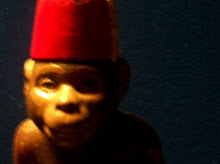I came across this in an email exchange between Bill Simmons of ESPN and Malcolm Gladwell, author of The Tipping Point and Blink. You can ignore the sports references, they are not essential to the point he is making.
Gladwell: This is actually a question I'm obsessed with: Why don't people work hard when it's in their best interest to do so? Why does Eddy Curry come to camp every year overweight?
The (short) answer is that it's really risky to work hard, because then if you fail you can no longer say that you failed because you didn't work hard. It's a form of self-protection. I swear that's why Mickelson has that almost absurdly calm demeanor. If he loses, he can always say: Well, I could have practiced more, and maybe next year I will and I'll win then. When Tiger loses, what does he tell himself? He worked as hard as he possibly could. He prepared like no one else in the game and he still lost. That has to be devastating, and dealing with that kind of conclusion takes a very special and rare kind of resilience. Most of the psychological research on this is focused on why some kids don't study for tests -- which is a much more serious version of the same problem. If you get drunk the night before an exam instead of studying and you fail, then the problem is that you got drunk. If you do study and you fail, the problem is that you're stupid -- and stupid, for a student, is a death sentence. The point is that it is far more psychologically dangerous and difficult to prepare for a task than not to prepare. People think that Tiger is tougher than Mickelson because he works harder. Wrong: Tiger is tougher than Mickelson and because of that he works harder.
I'm still thinking about this.
In other news, I finished a great book last week called In the Little World: A true story of dwarfs, love and trouble. I don't like the title and I suspect that whoever came up with it hadn't read the book. Marketing people no doubt. In any case it's one of those books that I wanted to give to three or four people as soon as I finished with it. It is ostensibly about dwarfs, but that is just scratching the surface. It is about difference, perception, judgment, embodiment, beauty, honesty, and a bunch of other stuff. It's also full of good stories about complex people and this makes it a very compelling read. There's just enough history and philosophy to ground some of these difficult issues but not enough to make it boring. I wish that I had written about the book as soon as I had finished it as it had me doing some serious ruminating. Unfortunately it's been busy at work with the end of the semester and I haven't had the time as of late. Disability and difference are things I've been thinking about for a long time and felt I've needed to sort out in my head and I suppose that's one reason I responded so strongly to this book. More on the topic later I hope. If anyone wants to read it, let me know and I will send it to you.


